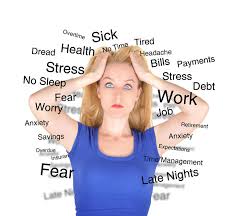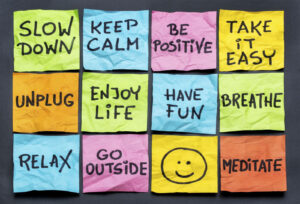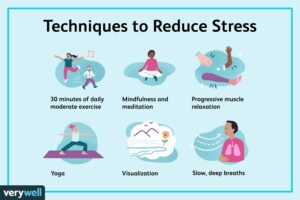The times and the era we live in are those of uncertainty. The state of flux caused by economic upheavals and pandemic-related restrictions have added to our health woes, with the crazy chaosis going on with our government to not protesting but RIOTING being allowed on college campuses like now aiding to having hypertension in your life that you didn’t have before. People have been facing stress on all fronts. Job losses, health issues starting, family issues or even losses, etc. Our government is not thinking of family (the US citizens but illegals? Really!) Stress can cause short-term spikes in blood pressure. It is your body doing FIGHT OR FLIGHT and your rotten diet living on fast food places or going 3 times a week as finally starting to impact you at a later age or now with the stress induced on it.
Being under stress can cause your blood pressure to spike briefly. But researchers aren’t sure whether stress can cause blood pressure to rise long-term.
Experts do know that exercising 3 to 5 times a week for 30 minutes can lower stress. For people with high blood pressure, doing activities that help manage stress and improve health can help lower blood pressure.
We do know furthermore the following facts in how reactions to stress can affect the blood pressure:
The body releases a surge of hormones when under stress. These hormones cause the heart to beat faster and the blood vessels to narrow. These actions increase blood pressure for a time.
There’s no proof that stress by itself causes long-term high blood pressure. But reacting to stress in unhealthy ways can raise blood pressure and increase the risk of heart attack and stroke.
Behaviors linked to higher blood pressure. What we do know already is how diet can impact B/P due to bad diet behaviors in your choice in what to eat commonly which is the following:
- Drinking too much alcohol or caffeine.
- Eating unhealthy foods=Processed, restaurants/fast foods, bakery items, food delivery, pizzeria, deli meats.
- Eating too much. Too much salt in your diet or caffeine or unhealthy foods.
- Not moving enough.
Heart disease also might be linked to certain health conditions related to stress, such as:
- Anxiety.
- Depression.
- Being cut off from friends and family.
Diabetes alot of times goes with heart disease, renal disease and others. The best thing too do eat healthy, stay in your body mass index (therapeutic weight), some exercise everyday 30 mins or more & routine M.D. check ups.
There’s no proof that these conditions are directly linked to high blood pressure but it can impact it. Remember again when we are under stress we go through flight and flight (meaning we either deal with it or we don’t at all). But the hormones the body makes when under emotional stress might damage arteries. The artery damage might lead to heart disease. And symptoms of depression and anxiety might cause some people to forget to take medicines to control high blood pressure or other heart conditions.
Stress can cause a steep rise in blood pressure. But when stress goes away, blood pressure returns to what it was before the stress. However, short spikes in blood pressure can cause heart attacks or strokes and may also damage blood vessels, the heart and the kidneys over time. The damage is like the damage from long-term high blood pressure.
SO THE BIG QUESTION IS CAN ANYTHING BE DONE IN CONTROLLING STRESS? THE ANSWER IS YES!!!
Here are some ways to manage stress:
One way is simply adjust your schedule. If you have too much to do, look at your calendar and to-do lists. Ask others to do some things. Schedule less time for activities that aren’t important to you. Say no to things you don’t want to do.
Harvard Health Publishing/Harvard Medical School states the following in helping to reduce stress:
- Get enough sleep. Inadequate or poor-quality sleep can negatively affect your mood, mental alertness, energy level, and physical health.
- Learn relaxation techniques. Meditation, progressive muscle relaxation, guided imagery, deep breathing exercises, and yoga are powerful relaxation techniques and stress-busters.
- Strengthen your social network. Connect with others by taking a class, joining an organization, or participating in a support group.
- Hone your time-management skills. The more efficiently you can juggle work and family demands, the lower your stress level.
- Try to resolve stressful situations if you can. Don’t let stressful situations fester. Hold family problem-solving sessions and use negotiation skills at home and at work.
- Nurture yourself. Treat yourself to a massage. Truly savor an experience: for example, eat slowly and really focus on the taste and sensations of each bite. Take a walk or a nap, or listen to your favorite music.
- Ask for help. Don’t be afraid to ask for help from your spouse, friends, and neighbors. If stress and anxiety persist, talk to your doctor.
Along with these ways to reduce stress, add in a healthy lifestyle — maintaining a healthy weight, not smoking, regular exercise, and a diet that includes fruits, vegetables, whole grains, lean protein, and healthful fats — and high blood pressure could be a thing of the past.
American Heart Association states the following in how to go about stress to lower it that decreases your B/P:
“1. You can’t control all the outside events in your life.
However, you can change how you handle them emotionally and psychologically. Try to learn to accept things you can’t change. You don’t have to solve all of life’s problems.
2. Think about problems under your control and make a plan to solve them.
You could talk to your boss about difficulties at work, talk with your neighbor if his dog bothers you or get help when you have too much to do.
3. Know your stress triggers.
Think ahead about what may upset you. Some things you can avoid. For example, spend less time with people who bother you or avoid driving in rush-hour traffic.
4. Reduce stress by taking care of your mood
Relaxing is important! Even if you are busy, take 15 to 20 minutes a day to sit quietly, breathe deeply and think of a peaceful picture.
5. Spend time developing supportive and nurturing relationships.
We all need supportive and encouraging relationships. Invest yourself in developing relationships that build character and foster growth.
6. Give yourself the gift of a healthy lifestyle.
Engage in physical activity regularly. Do what you enjoy; walk, swim, ride a bike or jog to get your muscles going. Letting go of the tension in your body will help you feel better.
Limit alcohol, don’t overeat and don’t smoke.
Relaxing for short periods during your workday, at night and on weekends may help lower your blood pressure. Another great stress-buster is to get regular physical activity.
7. Reduce stress by practicing gratitude and joy
Change how you respond to difficult situations, focusing on the positive, not the negative. Expressing gratitude to others can also boost your level of feeling good about life and reduce stressful thoughts.
8. Know what brings you pleasure and find ways to enjoy the experience.
Perhaps you enjoy volunteer opportunities or cooking your favorite foods. By taking time not only to participate in these activities but to intentionally enjoy them, you can build a satisfying life rather than hurry through your “relaxing activities” at a stressful pace.
Reducing B/P by reducing bad foods in our diet the would cause vessel vasoconstriction or blockages in our vessels causing HTN, with reducing stress in out lives, practicing activities healthy in our lives like getting a 1/2 to 1 full hour of exercise a day, meditating a few times a week, loosing weight to therapeutic level will all help reduce your B/P or HTN. It is all up to you in what moves you do to change your live to better your health and live a productive, happy and relaxing at frequency in your life! Don’t be ill that stops you from doing things you enjoy and be healthy!
Revised 5/07/24



